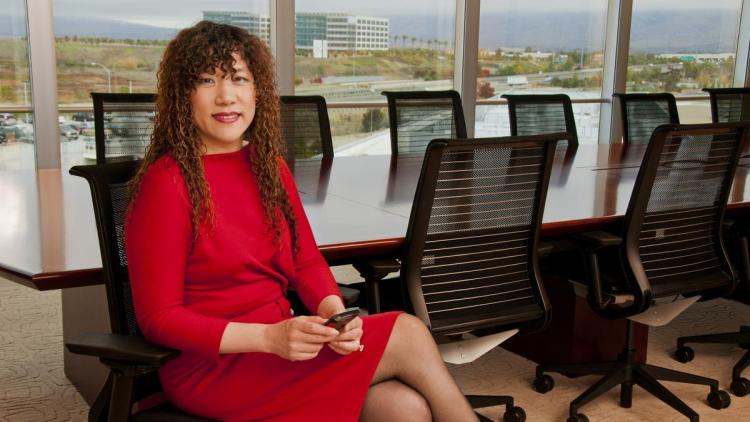A few years ago, I made the trek out to the headquarters of Marvell Technology Group in Santa Clara to meet cofounder and president Weili Dai. As an immigrant, an engineer, an entrepreneur and, yes, a woman, hers was a remarkable tale of success.
And it was a tale oft told. I wrote a profile for the Los Angeles Times following our interview. But I was hardly the first or the last to profile the astonishing woman who had been lauded so many times as a pioneer and an inspiration and a role model.
I’ll admit that I didn’t take too much notice when I heard some of the rumblings about accounting issues and investigations at Marvell a few months ago. So it was a shock to see that Dai and her husband, Marvell cofounder and CEO Sehat Sutardja, had been fired this week.
In a press release, the company said Sutardja and Dai will remain on the board of directors, with Sutardja continuing as chair. Marvell has created an executive committee to run the company while the board searches for new leadership. Marvell’s accounting firm resigned a few months ago and has been replaced in the midst of the ongoing inquiry.
The couple’s dismissal comes after a months-long probe found no accounting fraud. But, as Reuters noted, the investigation found: “There was ‘significant pressure’ from the management on sales teams to meet revenue targets. The audit committee also noted that internal controls were not fully followed and revenue was booked prematurely for some transactions.”
Certainly the demise of Sutardja is its own tragic story. But for many years, Dai served as the public face of Marvell. A tough executive who balanced that role with the role of goodwill ambassador for the company, she was funny, fashionable, scary smart, and personable.
Dai, a software engineer, and Sutardja, a chip designer, cofounded Marvell in 1995. The company is a “fabless” semiconductor company, meaning it designs the chips, and someone else builds them.
A native of Shanghai, Dai moved to the U.S. with her family as a girl. She became interested in technology at an early age and eventually graduated from UC Berkeley with a degree in computer science. As an undergraduate, she completed an internship at Bell Labs in New Jersey, and in 1984, after graduating, she started working at Xerox’s PARC lab in Palo Alto.
The company grew, with Dai receiving much of the public acclaim. As her bio on the company’s website notes: “Weili Dai is one of the most successful women entrepreneurs in the world today…the only woman cofounder of a global semiconductor company.”
Over time, the awards and plaudits piled high, as her bio also points out:
For her contributions to technology and society, Newsweek named Ms. Dai one of the “150 Women Who Shake the World” and was recently profiled by CNN International for the Leading Women Series: Leading the Female Tech Charge, Leading Women Principles Fair and Care, Educating for Future Success, and Leading Women Inspire Others. Additionally, Forbes Magazine lists Ms. Dai as one of the “World’s 100 Most Powerful Women.”
The Global Semiconductor Alliance (GSA) recently recognized Ms. Dai along with her husband Sehat Sutardja, CEO of Marvell, with the prestigious 2013 Dr. Morris Chang Exemplary Leadership Award.
When I met Dai in 2013, she had just recently participated in a round table of tech leaders who met with President Obama. Our meeting also followed her recognition by the state of California for her work advocating the need for more female engineers. She was one of 11 women honored by the California Assembly with its “Breaking the Glass Ceiling” award for “female pioneers in science, civil rights and government.”
“It was such an honor to be part of this group of 11 amazing women,” Dai told me that day. “I guess they picked me because they were looking for a geek. Just joking.”
She made it clear that in charting her success, she felt no need to bend to convention, nor change her identity to fit neatly into a male-dominated industry. That day we toured the company’s headquarters, which she had a strong hand in designing. She was proud to be passionate about sports, wore her geekiness on her sleeve, and was, above all, proud of being a woman in this field — something she felt was not just a liability to overcome, but a distinct advantage.
“It’s not just about developing ‘nerdy’ technology,” Dai said that day. “It’s about relating it to the social aspects of our lives. And guess what? A woman’s natural talent is design, and the look and feel, and making these things fit into our lifestyles.”
It will take some time for the dust to settle from the events this week. Perhaps when the full story emerges, and with the passing of time, she will be able to reclaim some sense of her reputation and legacy.
But for now, her tale has morphed from inspirational to cautionary. And Silicon Valley has once again been reminded that placing people on a pedestal too high can make their fall even more painful to watch.


